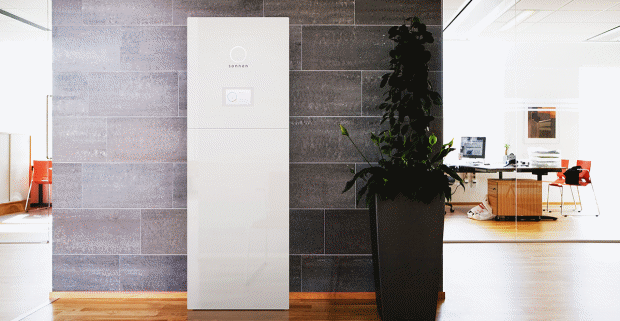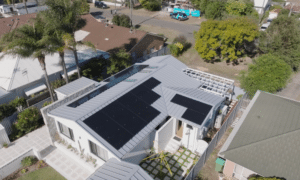Solar batteries cost is getting lower. Prices have steadily come down over the past 20 years. This is particularly true for the latest lithium-ion batteries – a real revolution in storage technology.
However, it’s not necessarily a benefit to hold off to see if prices come down further. Now is a great time to buy sonnen batteries or Tesla PowerWall 2 home batteries.
In this special post, Energy Matters looks at the world of solar storage batteries: when to buy, how to calculate correct size and configuration, and why some batteries are superior to others.
Lithium batteries for households
The average price of a lithium-ion battery pack is down to $209/kilowatt-hour. The price decline is due to a growing battery manufacturing industry with significant economies of scale starting to bring costs down.
Electric car makers are buying batteries for their vehicles, while renewable energy companies are using them to add storage to wind and solar power. As a result, prices are dropping fast.

Lithium-based batteries are becoming the most popular battery chemistry for residential users. Over ten years, lithium battery prices fell from US$3,000 to US$400 USD in 2015.
Now that lithium batteries are mass produced they make good commercial sense for Australian households. Most of the good quality lithium battery banks have a 10-year warranty.
It can be difficult to judge if batteries are worth it. But the growing uptake of home battery storage systems suggests that for many households it’s a good option. Energy Matters offers plenty of guidance on solar and home battery energy storage.
Do your battery homework, don’t rush in
For any household thinking of installing solar there are many important questions. The first is: How much do you use, and when do you use it? This will dictate the size of the battery.
Where you live is important too. It can depend on a number of factors such as how many households rent. The policy of the government can also play a role.
A report by the Climate Council says that by transitioning to 50 per cent energy by 2030, Queensland will create 28,000 jobs nationally.
The ACT aims to run 100 per cent by 2020. However, in the NT, 90 per cent of energy is supplied by natural gas. Solar, however, is gaining ground.
Solar batteries cost: Size matters, but so does value
There are are a number of things to consider when deciding on a battery storage system. Two of the most important are size and value.

For example, Tesla’s PowerWall 2 is one of Australia’s best sellers. It has 13.2 kWh of usable energy storage capacity. The battery also has an end-of-life retained capacity of 70 per cent.
Another question to ask is whether you are interested in going off the grid with your solar and storage. For more information on this, have a look at the Energy Matters site.
Don’t wait to invest in your solar battery storage
So, if solar batteries cost is falling, why not wait until prices come down further?
Andrew Stock has more than 40 years’ experience in the energy industry. Interviewed by ABC news, he said in some areas people should not wait for the price to drop.
“In some states that have high power prices, analysis shows it’s economical now to install batteries. Sunny states like South Australia and Queensland have relatively high power prices, so its quite economic to install battery systems.”
Stock added that if the batteries are modest in size and you have solar on your roof, that will allow you to offset that expensive power you draw from the grid.
Bruce Mountain, energy economist and director of Carbon and Energy Markets, agreed that South Australians would benefit from installing batteries sooner rather than later.
“That is simply because battery and solar prices have come down, and in South Australia energy prices have gone up so much,” he said.
He called on the government to invest more in the local solar industry, instead of subsidising coal-fired power stations.
Taking advantage of the boom time
With the recent electricity price hikes, many households are not waiting to switch to solar battery power. Interviewed by ABC, Master Electricians Australia CEO Matthew Richards said:
“I think we are on the leading edge of a boom time with batteries, when customers realise the savings in the cost of power and return on investment.”
Mr Richards said it could also be a life-saving measure when it came to protecting the elderly. “We have seen a number of cases where some of the elderly have succumbed to the heat and fallen ill or even worse.”
It seems like although solar batteries cost could fall further in the future, it’s never too early to switch to solar energy. While governments hold off on more investments, households can get all the benefits of renewable energy right now.












































